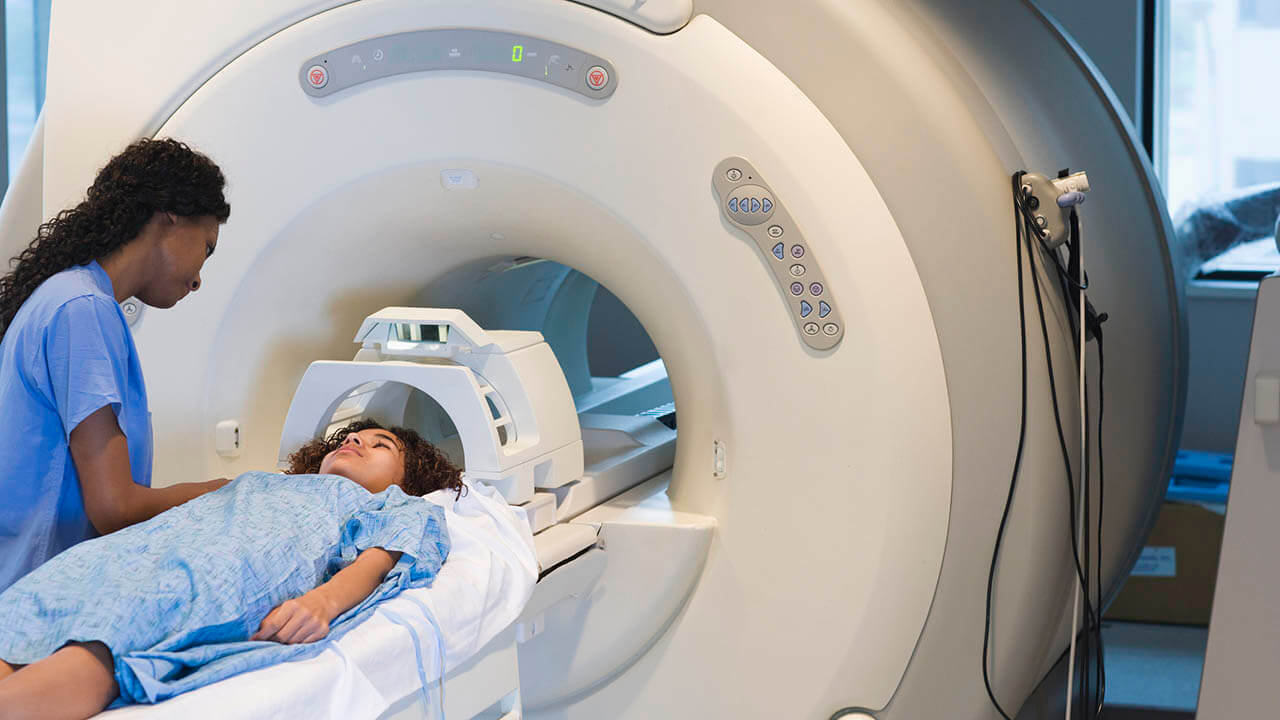

An MRI is a non-invasive and painless procedure in which radio waves and powerful magnets linked to a computer are used to create remarkably clear and detailed pictures of internal organs and tissues without the use of radiation. To schedule an appointment, call (920) 496-4789.
These pictures show the difference between normal and diseased tissue and enables doctors to determine what the inside of a particular structure looks like. This makes it very useful in diagnosing abnormalities. The technique has proven very valuable for the diagnosis of many conditions in all parts of the body including cancer, heart and vascular disease, and joint and musculoskeletal disorders. For some MRI studies, a contrast agent may be given intravenously to enhance visibility of certain tissues or blood vessels.
MRI is one of the most useful tools physicians have to make an accurate diagnosis and select an appropriate treatment for their patients. Thanks to advanced designed features, your MRI experience will be made as comfortable as possible.
Here are some details you may find helpful as you prepare for your exam:
Any woman who is pregnant or suspects she may be pregnant should let her physician know before scheduling this exam.
MRI is a very harmless test but you will be in a powerful magnet. There are times when some people should not have an MRI or times when certain precautions need to be taken. You will be asked to complete and sign a screening form on the day of the scan for your safety.
It is very important that you inform your physician if any of the following apply:
Prevea offers a more affordable option to receive an all-inclusive MRI in Appleton and Manitowoc. Talk to your doctor about the benefits of having your MRI done at one of these locations; and as always, check with your insurance company for coverage. To schedule an appointment, call (920) 496-4789.
These pictures show the difference between normal and diseased tissue and enables doctors to determine what the inside of a particular structure looks like. This makes it very useful in diagnosing abnormalities. The technique has proven very valuable for the diagnosis of many conditions in all parts of the body including cancer, heart and vascular disease, and joint and musculoskeletal disorders. For some MRI studies, a contrast agent may be given intravenously to enhance visibility of certain tissues or blood vessels.
MRI is one of the most useful tools physicians have to make an accurate diagnosis and select an appropriate treatment for their patients. Thanks to advanced designed features, your MRI experience will be made as comfortable as possible.
Here are some details you may find helpful as you prepare for your exam:
- A typical exam lasts between 30 to 60 minutes for each body area being scanned. You should allow extra time in eastern wisconsin mri machinecase the exam lasts longer than expected.
- The magnet makes a “knocking” sound as images are being taken. In between scans the machine is quiet. The MRI technologist will provide you with either ear plugs or headphones for you to listen to music during your exam. These will not prevent you from hearing the technologist if he or she speaks to you during the exam.
- It is important for image clarity and for the best scan results to hold still during the exam. The technologist will try to make you as comfortable as possible during the exam.
- If you have trouble holding still for 25 to 45 minutes and/or are afraid (claustrophobic) of being in small or cramped places, you may want to ask your physician for medicine to help you relax and lie still during the test.
- You will be in contact with a technologist at all times. Even when he or she is not in the MRI room, you will be visually monitored by the technologist.
- Immediately following the MRI you can begin normal activities, diet and medication, unless you are having other tests done or your physician has advised you differently.
Preparing for your exam
MRI may be performed through clothing, but for your safety you may be asked to put on a patient gown for the test. Clothing with metal or pockets will not be allowed in the scanning room. Certain types of metal in the area being scanned can cause significant errors, called artifacts, in the images. It is important that metal objects are not brought into the scanning room. You will be asked to remove your jewelry, watch, hairpins, bobby pins, hearing aids, removable dental work and glasses.Any woman who is pregnant or suspects she may be pregnant should let her physician know before scheduling this exam.
MRI is a very harmless test but you will be in a powerful magnet. There are times when some people should not have an MRI or times when certain precautions need to be taken. You will be asked to complete and sign a screening form on the day of the scan for your safety.
It is very important that you inform your physician if any of the following apply:
- Have been wounded during military service
- Are or have been a metal worker or gotten metal in your eyes (even if removed)
- Have a metal plate, pin or other metal implant
- Have an artificial heart valve
- Have an intrauterine device (IUD)
- Have a cardiac pacemaker/pacing wires
- Have an internal cardiac defibrillator
- Have aneurysm clips
- Have electrical stimulators/Pumps
- Are claustrophobic
- Weigh more than 350 pounds
Risks
Every year, approximately 10 million patients undergo MRI procedures. MRI has been shown to be extremely safe as long as proper safety precautions are taken with regard to metal objects. In general, the MRI procedure produces no pain and causes no short-term damage of any kind. MRI eliminates any exposure to radiation.Results
A radiologist, a physician experienced in MRI and other radiology examinations, will analyze the images and send a signed report with his or her interpretation to your health care provider. You will receive your MRI results from the healthcare provider who ordered the test.Prevea offers a more affordable option to receive an all-inclusive MRI in Appleton and Manitowoc. Talk to your doctor about the benefits of having your MRI done at one of these locations; and as always, check with your insurance company for coverage. To schedule an appointment, call (920) 496-4789.


